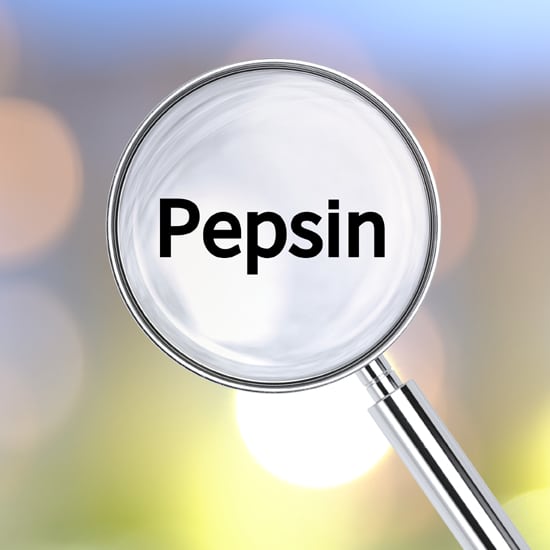At-A-Glance
- This is a two-part post: First, to highlight the current research and development of anti-pepsin drugs using fosamprenavir; and second, to present the author’s current approach to pepsin eradication and wash-out in people with respiratory reflux, including the novel use of alkaline water throat spray.
- When you have an acid reflux event, up comes acid and pepsin, the latter being the main digestive enzyme of the stomach. Next, the pepsin binds to the surface of tissues in its path (e.g., esophagus and respiratory tract). Then, the pepsin can attack, penetrate, and damage tissue. It’s pepsin (not acid) that wreaks the havoc from acid reflux; it causes inflammation and reflux-related disease. For more about pepsin, read my previous pepsin post.
- Pepsin, the first enzyme to start the digestion process, belongs in the stomach where it does not cause problems; so you don’t have to get rid of it there. The target of anti-treatment should be to rid your body of pepsin elsewhere, such as in the ears, nose, sinuses, vocal cords, throat, tracheobronial tree, lungs, and esophagus.
- As many as 100 million Americans Respiratory Reflux (LPR) and most have Silent Reflux, which occurs at night during sleep. While PPIs (proton pump inhibitors) can ease some people’s symptoms, PPIs cure zero percent of refluxers. Until now, there have been no medications that effectively combat pepsin.
What Is the Respiratory Reflux (LPR) Problem?
Pepsin. It’s pepsin, the main enzyme of the stomach that causes tissue inflammation in the respiratory tract [refs. 1-9]. Unfortunately, most people with Respiratory Reflux (aka LPR) have Silent Reflux, which means that neither the patient nor the doctor realizes that the underlying problem is reflux. And that’s the case for millions of people with post-nasal drip, nasal and sinus disease, voice problems, asthma, bronchitis, globus, chronic cough, COPD, snoring and sleep apnea.

These photos of a biopsy taken from the back of the larynx of a patient with reflux laryngitis show the histopathology of reflux (under the microscope). The biopsies are stained to show inflammation (left) and inflammation with pepsin (right); the dark brown is pepsin. These photos demonstrate that pepsin is intimately associated with the inflammation, and the more pepsin, the worse the inflammation.
If you have respiratory reflux (LPR) your (nose, throat, voice box, etc.) biopsies would look just like this. And remember that it is the pepsin that causes the inflammation, mucus, and even may cause cancer. It’s all about the PEPSIN!
Acid-suppressive medications, including PPIs (proton pump inhibitors) — that I never ever recommend using — do nothing about pepsin. Indeed, PPIs never cure reflux. Even in term of symptom improvement, PPIs are at best mediocre meds … and if you took a handful of Prilosec every day, you’d still make quite a lot of stomach acid. And alarmingly, long-term use of PPIs increases the risk of reflux-caused esophageal cancer. PPIs are like a big, but dangerous band aid, which covers up the real problem [refs. 10-12].
Fosamprenavir and New Anti-Pepsin Treatments in Development by N-Zyme Biomedical
Compelling scientific evidence has already proven that pepsin causes reflux-attributed respiratory findings, symptoms, and diseases [refs. 1-3,4-7,9]. Again remember clinical trials with PPIs have failed to demonstrate any significant therapeutic benefit for respiratory reflux (LPR) [refs. 11-12], yet millions of people are on them at a cost of $26 billion per year. With no effective anti-pepsin medical therapy yet available, there is a huge and promising opportunity to address this need.
We Are Developing New Anti-Pepsin Treatments† Our multi-disciplinary and multi-institutional collaborative team has identified fosamprenavir as a drug that binds to, and inhibits peptic activity, actually preventing pepsin-mediated inflammation and tissue damage. The new company, N-Zyme Biomedical, should have fosamprenavir clinical trials running by year’s end; if you are interested, see N-Zyme Investor Presentation.
† Full Disclosure: The author (JK) is an N-Zyme Biomedical medical adviser and stockholder.
Already FDA-approved, fosamprenavir is currently being used to target HIV virus, obviously not present in most individuals. However, it has an excellent safety profile and is well-tolerated, making it an ideal drug to repurpose to treat reflux because of its anti-pepsin activity. Interestingly, and in support of fosamprenavir for LPR; patients taking it for HIV have a lower incidence of LPR (0.2%) compared to the general population (30%) [ref. 13].
The FDA has approved a 12-week, randomized, double-blinded, placebo-controlled, phase III clinical trial study to assess the efficacy of oral fosamprenavir for respiratory reflux (LPR). But perhaps the company’s most significant goal is to provide inhaler treatment for respiratory reflux, allowing a higher concentration of the drug where it is needed at the disease site with low levels of systemic absorption. This will likely increase efficacy and decrease side effects.
Using a mouse model, we have already shown the efficacy of low-dose inhalation treatment with fosamprenavir for pepsin-mediated laryngeal inflammation and mucosal damage from LPR [ref. 13]. Furthermore, preliminary inhalation toxicology studies suggest inhalation treatment using a fosamprenavir dry powder inhaler is completely safe.
Pepsin Paradigm Shift Coming. We believe that fosamprenavir inhalation treatment is likely to be the next big thing in reflux treatment. It may safely “cure” many of the common afflictions of respiratory reflux and possibly even reduce airway cancer incidence. This treatment should improve the quality of life for millions of people suffering from respiratory reflux (LPR).
What Can I Do to Get Rid of the Pepsin in my Throat? Spray It Away!
Bottom Line: Reflux is reversible, but you need to stop reflux in its tracks completely for weeks so that the inflamed and injured parts of the digestive and respiratory tracts can heal. That’s why I recommend a Reflux Detox Program, discussed in brief below. But to help wash out the hard-to-reach and imbedded pepsin, try spraying your throat with alkaline water. This is especially helpful for people with too-much mucus, chronic throat-clearing, voice symptoms, globus, chronic sore throat and cough.

Shown here are three items which I recommend: the Cerra Water (pH 9.5) pitcher, a user-friendly, water cup, and a spray bottle.
Here’s what I a recommending and why: When swallowed, alkaline water does not usually get into the voice box or lower throat, because the throat clamps shut during swallowing to prevent aspiration, water going down the wrong pipe into the lungs. But, when you have active respiratory reflux, with every reflux event, acid and Pepsin come up to where they shouldn’t be, especially on vocal cords and upper valve area (UES).
That’s said, pepsin dies — the protein is denatured, broken — at pH 9 [ref. 14], and that’s where the alkaline water spray comes in. If you open your mouth, lower/flatten your tongue, and slowly breathe in as you spray towards the back of your throat, you will successfully deliver pH 9.5 water mist to the lower throat, especially to the vocal cords.
Here’s the two-ounce, cobalt blue, glass, spray bottle (Amazon Prime $9.49 for 4 bottles) that I recommend. It works well and won’t leak in your bag (but don’t lose the top).

Many of my singers use this spray often. Many carry it with them. It is the only easy treatment we have that delivers pepsin-killing alkaline water directly to the vocal cords. Remember, alkaline water is completely safe; there are no side effects or down-sides.
What Is Dr. Koufman’s Reflux Detox Program?
Remember, you need to stop reflux in its tracks completely for weeks so that the inflamed and injured parts of the digestive and respiratory tracts can heal, including the LES and UES. That’s why I recommend this 3-week to 3-month Reflux Detox Program. In a nutshell …
No eating within 5-hours of bed
Sleep at a 45-degree incline
Low-acid, low-fat diet
Avoid of all trigger foods
Gaviscon Advance Aniseed to reduce reflux
Famotidine (not PPIs) to reduce stomach acid
Alkaline water and alkaline water throat spray
Gum-chewing after eating
These topics are covered in greater detail as well as the three phases of my program throughout this blog and in my two (companion) books Dropping Acid and Dr. Koufman’s Acid Reflux Diet.
References
- Koufman J. The otolaryngologic manifestations of gastroesophageal reflux disease (GERD): A clinical investigation of 225 patients using ambulatory 24-hour pH monitoring and an experimental investigation of the role of acid and pepsin in the development of laryngeal injury. Laryngoscope 101 (Suppl. 53):1-78, 1991
- Axford SE, Sharp S, Ross PE, Pearson JP, Dettmar PW, Panetti M, Koufman J. Cell biology of laryngeal epithelial defenses in health and disease: Preliminary studies. Ann Otol Rhinol Laryngol 110:1099-1108, 2001.
- Johnston N, Bulmer D, Gill GA, Panetti M, Ross PE, Pearson JP, Pignatelli M, Axford A, Dettmar PW, Koufman J. Cell biology of laryngeal epithelial defenses in health and disease: Further studies. Ann Otol Rhinol Laryngol 112:481-491, 2003.
- Johnston N, Knight J, Dettmar PW, Lively MO, Koufman JA. Pepsin and carbonic anhydrase isoenzyme III as diagnostic markers for laryngopharyngeal reflux disease. Laryngoscope 114:2129-34, 2004.
- Gill GA, Johnston N, Buda A, Pignatelli M, Pearson J, Dettmar PW, Koufman JA. Laryngeal epithelial defenses against laryngopharyngeal reflux (LPR): Investigations of pepsin, carbonic anhydrase III, pepsin, and the inflammatory response. Ann Otol Rhinol Laryngol 114:913-21, 2005.
- Johnston N, Dettmar PW, Lively MO, Koufman JA. Effect of pepsin on laryngeal stress protein (Sep70, Sep53, and Hsp70) response: Role in laryngopharyngeal reflux disease. Ann Otol Rhinol Laryngol 115:47-58, 2006.
- Johnston N, Dettmar PW, Bishwokarma B, Lively MO, Koufman JA. Activity/stability of human pepsin: Implications for reflux attributed laryngeal disease. Laryngoscope. 117:1036-9, 2007.
- Rees LE, Pazmany L, Gutowska-Owsiak D, Inman CF, Phillips A, Stokes CR, Johnston N, Koufman JA, Postma G, Bailey M, Birchall MA. The mucosal immune response to laryngopharyngeal reflux. Am J Respir Crit Care Med. 177:1187-93, 2008.
- Birchall MA, Bailey M, Gutowska-Owsiak D, Johnston N, et al. Immunologic response of the laryngeal mucosa to extraesophageal reflux. Ann Otol Rhinol Laryngol. 117:891-5, 2008. F.
- Hvid-Jensen, L. Pedersen, P. Funch-Jensen, A. M. Drewes. Proton pump inhibitor use may not prevent high-grade dysplasia and oesophageal adenocarcinoma in Barrett’s oesophagus: a nationwide study of 9883 patients. Alimentary Pharmacology and Therapeutics, pp. 1-8, 2014.
- Reimer C, Bytzer P. Management of laryngopharyngeal reflux with proton pump inhibitors. Ther Clin Risk Manag. 4:225-233,2008.
- Liu C, Wang H, Liu K. Meta-analysis of the efficacy of proton pump inhibitors for the symptoms of laryngopharyngeal reflux. Braz J Med Biol Res. 49:2016.
- Johnston N, Samuels TL, Goetz CJ, et al. Oral and Inhaled Fosamprenavir Reverses Pepsin-Induced Damaged in a Laryngopharyngeal Reflux Mouse Model. Laryngoscope 2022 Jun 09 PMID: 35678265
- Koufman JA, Johnston N. Potential benefits of pH 8.8 alkaline drinking water as an adjunct in the treatment of reflux disease. Ann Otol Laryngol Rhinol 121:431-434, 2012.
Special Thanks and Recognition: From 2003-2006, I worked with Dr. Nikki Johnston as a pepsin and LPR researcher in my laboratory at Wake Forest University. Some of the landmark papers cited above are from our work together during that period of time. Since 2006, Dr. Johnston has been working at the Medical College of Wisconsin. Her groundbreaking work has continued, and she is unquestionably the world expert on pepsin.










